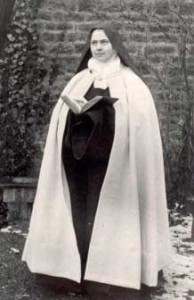Podcast: Play in new window | Download (Duration: 29:14 — 20.2MB) | Embed
Subscribe: Apple Podcasts | Spotify | Amazon Music | Android | Pandora | iHeartRadio | JioSaavn | Podchaser | Gaana | Podcast Index | Email | TuneIn | Deezer | Anghami | RSS | More

Episode 13 – “Heaven in Faith” Day 7 Prayer 1 – “God chose us in Him before creation, that we should be holy and immaculate in His presence, in love.”
In this episode, Dr. Anthony Lilles and Kris McGregor discuss the rich teachings of Blessed Elizabeth of the Trinity, particularly focusing on the concept of contemplative prayer and its transformative power. They delve into Elizabeth’s writings, highlighting her emphasis on the Holy Trinity and the inner life of God as foundational to understanding prayer and dealing with sin.
Elizabeth’s teachings invite listeners to slow down, make prayer a priority, and enter into the loving gaze of God and the primacy of contemplation in the Christian life, wherein believers are called to behold and participate in the eternal love and harmony of the Trinity. This contemplative approach transcends mere intellectual understanding and involves a deepening relationship with God through faith and love.
The ancient understanding of truth is something to behold rather than solve; the transformative nature of encountering the truth of God’s love. They discuss how contemplative prayer helps individuals confront their brokenness and sinfulness, leading to self-awareness and a deeper reliance on God’s grace for transformation and healing, and the profound gift of contemplative prayer in opening hearts to God’s presence, fostering spiritual growth, and enabling believers to live more fully in accordance with God’s love and truth.
 From “Heaven in Faith: Day 7 Prayer 1”:
From “Heaven in Faith: Day 7 Prayer 1”:
22. “God chose us in Him before creation, that we should be holy and immaculate in His presence, in love.”
“The Holy Trinity created us in its image, according to the eternal design that it possessed in its bosom before the world was created,” in this “beginning without beginning” of which Bossuet speaks following St. John: “In principio erat Verbum.” In the beginning was the Word; and we could add: in the beginning was nothing, for God in His eternal solitude already carried us in His thought. “The Father contemplates Himself” “in the abyss of His fecundity, and by the very act of comprehending Himself He engendered another person, the Son, His eternal Word. The archetype of all creatures who had not yet issued out of the void eternally dwelt in Him, and God saw them and contemplated them in their type in Himself. This eternal life which our archetypes possessed without us in God, is the cause of our creation.”
23. “Our created essence asks to be rejoined with its principle.” The Word, “the Splendor of the Father, is the eternal archetype after which creatures are designed on the day of their creation.” This is “why God wills that, freed from ourselves, we should stretch out our arms towards our exemplar and possess it,” “rising” above all things “towards our model.” “This contemplation opens” the soul “to unexpected horizons.” “In a certain manner it possesses the crown towards which it aspires.” “The immense riches that God possesses by nature, we may possess by virtue of love, by His dwelling in us and by our dwelling in Him.”“It is by virtue of this immense love” that we are drawn into the depths of the “intimate sanctuary” where God “imprints on us a true image of His majesty.” Thus it is, thanks to love and through love, as the Apostle says, that we can be holy and immaculate in God’s presence, and can sing with David: “I will be unblemished and I will guard myself from the depths of sinfulness within me.”
Elizabeth of the Trinity. The Complete Works of Elizabeth of the Trinity, vol. 1 (featuring a General Introduction and Major Spiritual Writings) (Elizabeth of the Trinity Complete Work) (pp. 103-104). ICS Publications. Kindle Edition.
Discerning Hearts Reflection Questions
- Reflecting on Prayer Priority: How does Blessed Elizabeth of the Trinity’s emphasis on the richness of prayer challenge your own priorities in daily life? Are there competing demands that hinder your ability to prioritize prayer?
- Contemplation of the Trinity: Consider the concept of the Trinity as presented in the podcast. How does understanding the inner life of the Trinity deepen your appreciation of God’s love and inform your prayer life?
- Embracing the Mystery: In what ways can you shift your perspective on the concept of mystery, moving away from a desire to solve or conquer it, towards a posture of beholding and embracing its beauty? How might this shift impact your spiritual journey?
- Encountering Truth: Reflect on the ancient understanding of truth discussed in the podcast. How does this perspective reshape your approach to seeking truth in your life? In what ways can you allow truth to illuminate and transform your heart?
- Confronting Brokenness: Consider the idea of confronting brokenness and sinfulness in prayer. How do you currently engage with your own brokenness and weaknesses in prayer? How might you deepen your reliance on God’s grace for transformation and healing?
- Priority of Contemplation: Reflect on the notion of the primacy of contemplation in the Christian life. How can you cultivate a deeper commitment to contemplative prayer amidst the busyness and distractions of daily life?
We would like to thank Miriam Gutierrez for providing “the voice” of St. Elizabeth for this series
For other episodes in the series visit the Discerning Hearts page for Dr. Anthony Lilles
Anthony Lilles, S.T.D., has served the Church and assisted in the formation of clergy and seminarians since 1994. Before coming to St. Patrick’s, he served at seminaries and houses of formation in the Archdiocese of Denver and the Archdiocese of Los Angeles. The son of a California farmer, married with young adult children, holds a B.A. in theology from the Franciscan University of Steubenville with both the ecclesiastical licentiate and doctorate in spiritual theology from the Pontifical University of Saint Thomas Aquinas in Rome (the Angelicum). An expert in the writings of St. Elizabeth of the Trinity and the Carmelite Doctors of the Church, he co-founded the Avila Institute for Spiritual Formation and the High Calling Program for priestly vocations. He also founded the John Paul II Center for Contemplative Culture, which hosts symposiums, retreats, and conferences. In addition to his publications, he blogs at www.beginningtopray.com .


 From “Heaven in Faith: Day 7 Prayer 1”:
From “Heaven in Faith: Day 7 Prayer 1”: